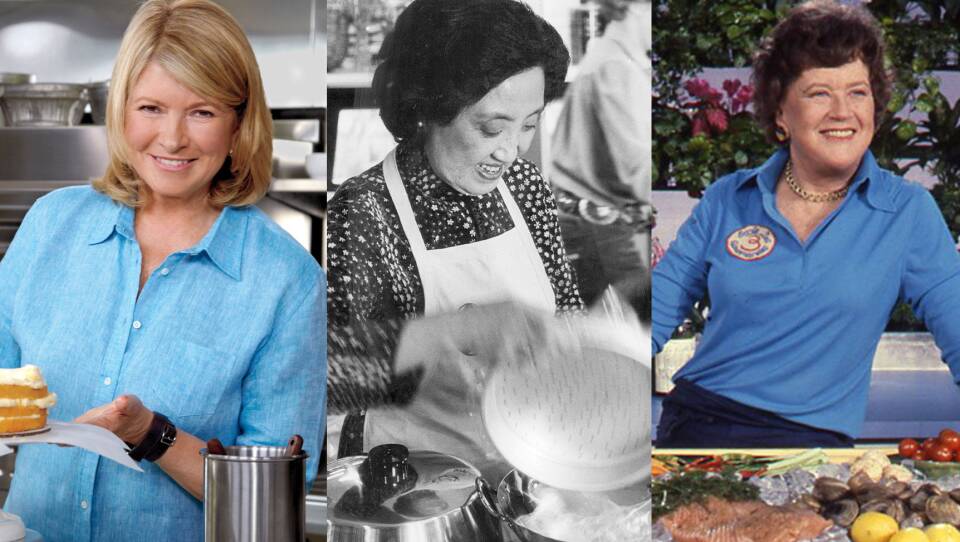In 1796, a woman authored American Cookery, the first American-written cookbook. It influenced New England food culture by introducing dishes like cranberry sauce and pumpkin pie, and is considered by the Library of Congress to be one of the “Books That Shaped America.”
In 1866, a Black woman published A Domestic Cook Book: Containing a Careful Selection of Useful Receipts for the Kitchen. The cookbook presented over 200 Southern recipes, including fried catfish, and highlighted the complex culinary skills required to cook the dishes properly. It's the first known cookbook by a Black woman in the United States.
In 1946, two women laid the foundation for the Culinary Institute of America, a world-class institution that didn't accept female students until the 1970s. Today, its undergraduate enrollment is 51% female.
The history of food culture in America is overflowing with stories of exceptional women — and nowhere is their influence more outsized than in the genre of educational cooking programs. From Julia Child's ability to take the mystery out of French cuisine to Joyce Chen using her show's popularity to advocate for political policy changes, the five women below lent their talents to the culture of education-based cooking shows and not only created a new genre of programming; they also molded the way we cook, eat, talk, and think about food today.
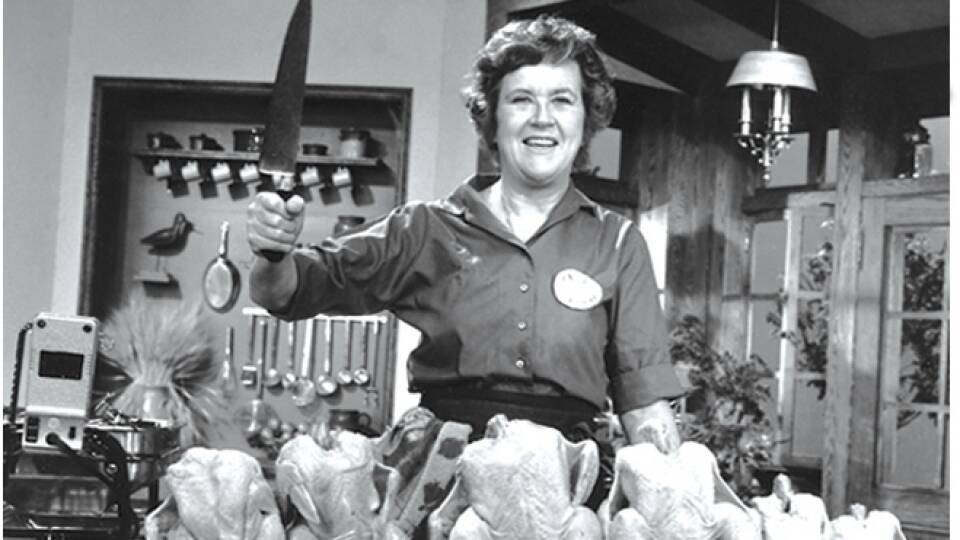
Julia Child
Twenty-seven letters are what it took to convince WGBH to give Julia Child her own cooking show. It was 1962, and Mastering the Art of French Cooking, which included these recipes and more, had recently been published. Child made an appearance on the station's book review program I've Been Reading to promote the cookbook, which she co-authored with her L'Ecole des Trois Gourmandes colleagues. Viewers were charmed when she whipped up an omelet in a cooking demo, and WGBH received over two dozen letters insisting that she host a cooking program.
The French Chef debuted in February 1963 and was an immediate hit. The show received several awards over its ten years on air, including the first Emmy for an educational program, and it launched a new genre of programming for public television. In 1972, it became the first television program to be captioned for the deaf or hard of hearing.
Equally important to her superstardom on the screen is Child's cultural influence. Her approach to “taking the bugaboo out of French cooking” taught home cooks everywhere how to move beyond social constructs and be more independent in their kitchens. Child respected the work of women, demanding more representation in professional kitchens, and using her own celebrity to elevate the culinary careers of other female chefs by featuring them in her programs. In 1993, she became the first woman inducted into the Culinary Institute of America's Hall of Fame.
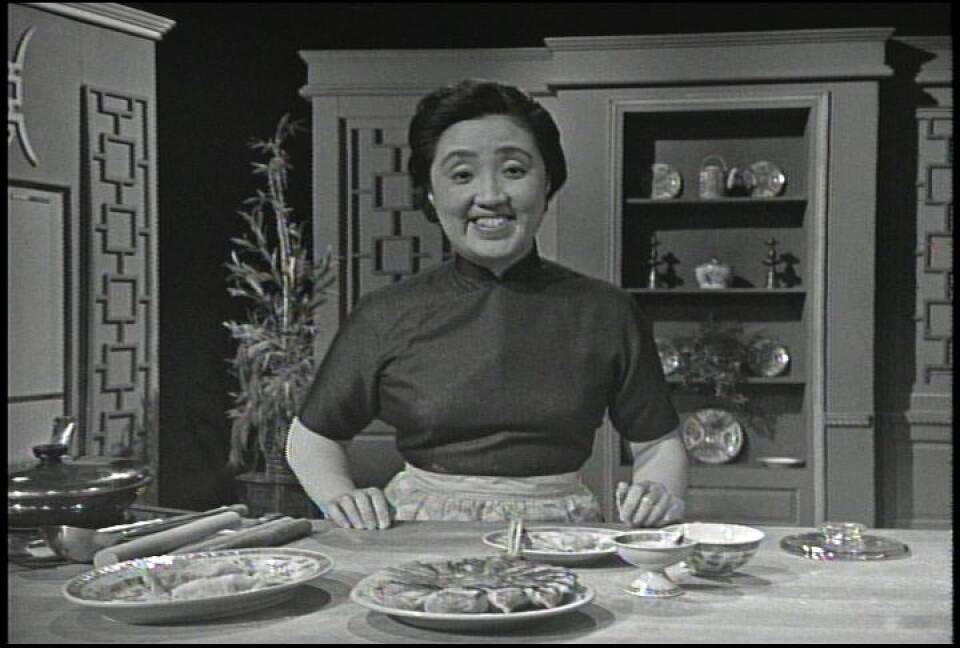
Joyce Chen
Joyce Chen's culinary journey began in Beijing, China, where she learned how to cook at a young age. In 1949, she and her family moved to Cambridge, Massachusetts where she built interest around Chinese cuisine with her egg rolls at a school function. Chen started teaching cooking classes and making meals for Chinese students at Harvard University. As popularity around her cooking spread, she independently published the Joyce Chen CookBook, full of northern Chinese recipes, including these recipes for sweet and sour pork, and Peking ravioli, simplified for American tastes. In 1958, she opened the first Mandarin restaurant in New England, simply named Joyce Chen Restaurant, where she introduced now-ubiquitous items — like buffet-style meals and menus with both Chinese and American translations — to help American diners be more open to trying new cuisine. Chen continued to build a loyal following around her cuisine, attracting the attention of culinary royalty, including fellow Cambridge resident Julia Child, and subsequently, WGBH, who had been seeking new instructional cooking program opportunities since the success of The French Chef.
Joyce Chen Cooks premiered on WGBH in 1966. On the show, Chen created dishes using Chinese cooking techniques and flavor combinations, emphasizing healthy recipes and substituting American ingredients when possible. WGBH filmed 26 episodes for the first season, but the show struggled to secure funding for a second one. Its success relied heavily on its ability to plug and play into the formula of The French Chef — instructional programming that demystified foreign cuisine for American cooks. Chen's show was even filmed on the same set. But the variables were too different. Chen's recipes were labor-intensive, and despite the reputation her cuisine had with culinary professionals, American diners struggled to view Chinese food as a high-class cuisine.
Nevertheless, Chen went on to make history, becoming the first woman of color to host an instructional cooking program. She opened three more restaurants in Massachusetts and popularized Chinese dishes like Peking duck, scallion pancakes, and hot and sour soup among American diners. Chen used her reputation to lobby politicians and fight immigration quotas to bring more Chinese cooks to America, many of whom went on to open successful restaurants of their own, and she expanded her brand into the American market with a product line that introduced Chinese-style condiments and cooking utensils to home cooks, including a game-changing flat-bottomed wok she patented in 1970.
Martha Stewart
Who knew that the simple pleasures of everyday living could be a multi-billion dollar enterprise? Martha Stewart did. She used her entrepreneurial instincts to turn a home-based catering business into a lifestyle program and world-famous brand, and that's a “good thing.”
Stewart started her catering business after graduating from college and became known for her gourmet menus, creative presentations, and ability to refashion domesticity details into a lavish celebration. In 1986, she made her television debut on the PBS special Holiday Entertaining with Martha Stewart, where she demonstrated creative and practical skills for entertaining during the holidays. The program was a success and spurred her drive to pursue more television opportunities.
Stewart continued to build on her media empire with cookbooks, and a best-selling magazine. By 1997, she founded Martha Stewart Living Omnimedia and had cultivated a domestic icon so powerful, it weathered a 2004 insider trading conviction.
What also weathered over was a persistent sexist double-standard that remains pervasive throughout the media industry to this day. Stewart, a powerful and successful CEO, is often criticized for being tenacious and assertive, qualities that earn her male counterparts' praise. During her conviction, she was scrutinized and publicly shamed in a way that men investigated for the same crime have not historically experienced.
Through it all, Stewart rebounded and continued to build her brand. She went on to create more cooking and lifestyle shows, and in 2012, returned to PBS for Martha Stewart's Cooking School, a three-time James Beard Foundation Award-winning program that explores basic cooking methods to help home cooks sharpen their skills.
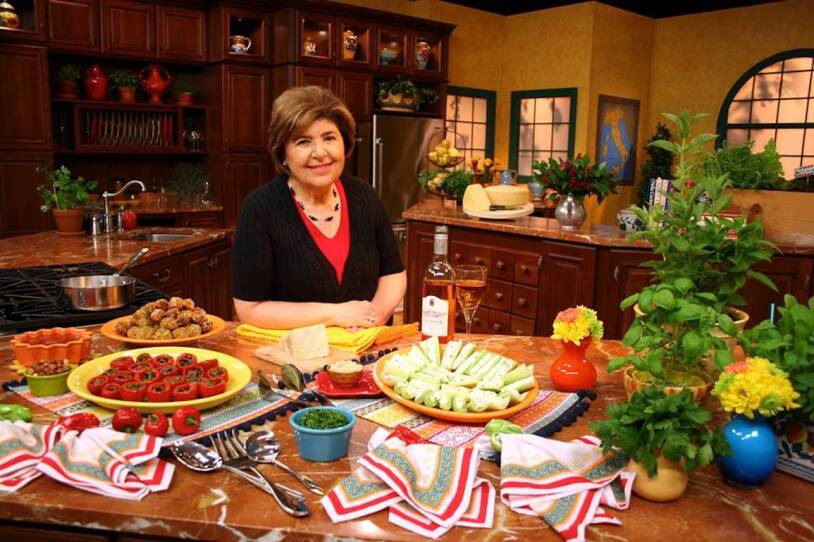
Mary Ann Esposito
Mary Ann Esposito had been running a catering business and teaching cooking classes at a local New Hampshire college when she decided to pitch a cooking show about the rich traditions of Italian cuisine. The station manager at New Hampshire Public Television declined, but ultimately greenlit a pilot, and in 1989, production began in Esposito's home kitchen. They knew it would be the first regionally produced broadcast cooking program, but neither had the foresight to know it would become the longest-running cooking program in America.
Ciao Italia debuted in January 1990, becoming the first Italian-focused cooking program to broadcast on public television. On the show, Esposito explores Italy's history and culture through its regional foods, each dish made with ingredients accessible to American home cooks. She went on to publish over a dozen cooking books about Italian cooking and entertaining. “What You Knead,” Esposito's cookbook about breadmaking, was awarded best in category by the International Cookbook Revue and named one of Food & Wine's top cookbooks of 1997.
Thirty years later and the program is still running. Not much has changed. The production moved to a studio set loosely based on Esposito's kitchen, but the dishes are still tested in her home and upheld to the same quality and accessibility standards. Esposito has received several awards for her efforts to preserve Italian food and culture, including, most recently, a Hall of Fame honorific from the Italian Trade Commission.
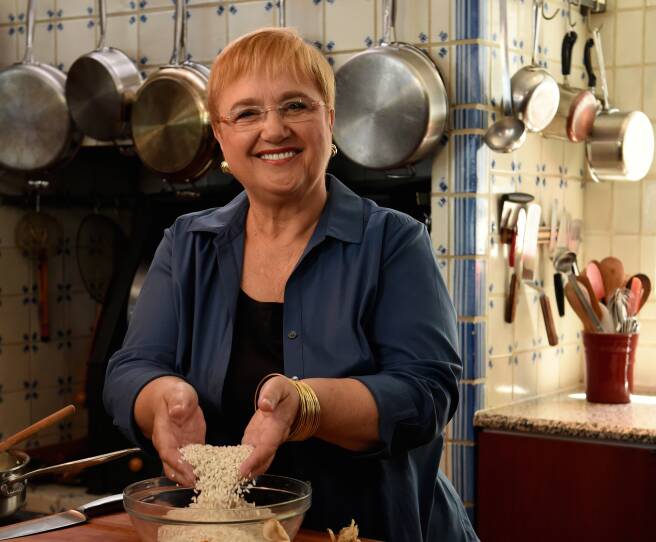
Lidia Bastianich
Lidia Bastianich didn't speak a lick of English when she emigrated to the United States in 1971. But she was fluent in the rich traditions of Italian kitchens, which led her down the path to opening several restaurants in New York and eventually finding her way to public broadcasting. It was 1993 when Bastianich's restaraunt Felidia won “Best Chef of New York,” the first of several forthcoming James Beard awards. This was also the year she met Julia Child. Child fell in love with a risotto dish served at the restaurant and invited Bastianich to appear on her show, Julia Child: Cooking With Master Chefs. She performed so well that the producers invited her to host a show of her own.
Lidia's Italian Table debuted on PBS in 1998, each episode filled with vibrant recipes and imaginative ideas for everyday cooking. Since its premiere, Bastianich has become a staple on public television, and a fan favorite, hosting numerous specials and cooking programs throughout the years, including Lidia's Family Table, Lidia's Italy, and Lidia's Italy in America.
Bastianich expanded her brand into a series of cookbooks and cookware. In 2010, she and her son Joseph opened Eataly, a food emporium in Manhattan devoted to Italy's food and culinary traditions. The Italian food hall has since expanded into many cities, including Boston.
In 2013, Bastianich returned to public broadcasting with the award-winning Lidia's Kitchen, where she continues to teach audiences how to draw on their roots to create a sense of home in the kitchen. As she is known to say, “Tutti a tavola a mangiare!” (“Everyone to the table to eat”).
